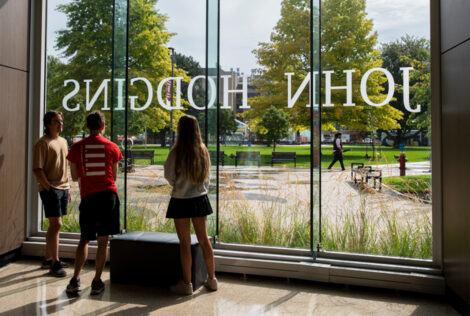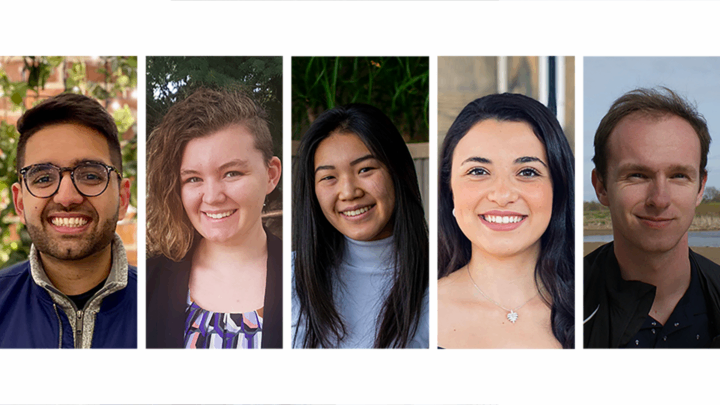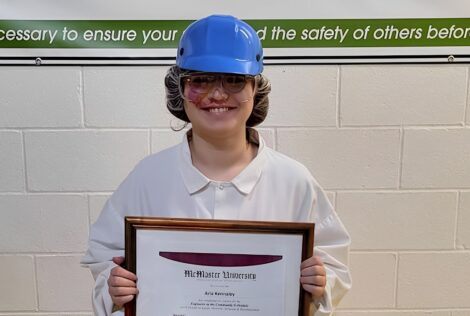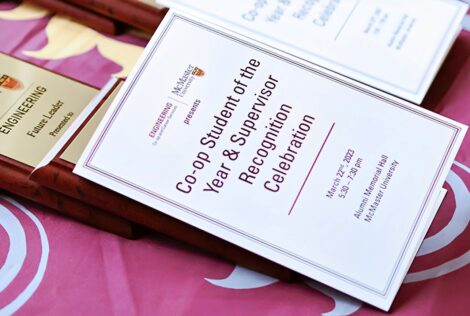

This year’s Co-op Return to (Virtual) Campus Event on September 16 welcomed 235 participants.
The event offered students the chance to virtually connect with and learn from experienced co-op students and leaders from McMaster Engineering.

Five students who attended this year’s event share their experiences in past co-ops and provide advice to job seekers during our rapidly changing times below:
Nimish Hegde, Mechanical Engineering
Most recent Co-op Placement: Product Manager Intern at Microsoft (Azure)
What he learned: Fundamental Product Management skills from various senior PMs that he worked alongside with. He also learned how to conduct customer interviews, create a comprehensive technical feature document, design User Interface mockups, and build a product roadmap and launch plan.
How did you get the opportunity to work in the U.S At Microsoft and Tesla?: Nimish advised those looking to work abroad to “leverage the power of LinkedIn and to network with McMaster Alumni who are working in the roles and at the companies that you are targeting.” Through persistent networking, Nimish was able to get many referrals from big tech companies in California and Seattle which allowed him to receive numerous interviews.
Advice for first-time job seekers: Look for start-up and smaller companies that are making an immense impact. Find methods to network with the CEO or engineers on the team and have a conversation with them about their products and vision. Through these steps, you can express interest in the company while also speaking about your skills and abilities to the employees you are networking with.
Kelly de Chastelain Finnigan, Civil Engineering and Management
Most recent Co-op Placement: Research Assistant working with Dr. Sarah Dickson (Faculty of Civil Engineering)
What she learned: The basics of Hydrogeology, how to make 3D stratigraphic models, and what being on a research team is like. She also learned how to communicate with superiors in a professional setting.
“How do I get a co-op like yours?”: Kelly’s advice was to reach out to professors in your desired faculty and ask about research opportunities. Show an interest and do your research, and even if you do not get a co-op, you make an impression on the professors who could help you later.
Advice for first-time job seekers: It is ok to not get a co-op right after the first year. It is great if you do so definitely keep trying but try not to stress too much about it.
Jessica Lim, Biomedical & Software Engineering
Most recent Co-op Placement: Software Engineering Intern (Garage) at Microsoft
What she learned: How nice people are and how willing they are to go out of their way to help and support students. Throughout her internship, she had the opportunity to speak with many Senior Managers, Directors, and CVPs at Microsoft.
“If you are enthusiastic and curious about something, and you’re willing to take the risk to reach out to people, you’d be shocked by how willing people are to share their passions.”
“How can you get your resume noticed without relevant work experience?”: When Jessica got her first co-op, the only job she ever held was a Skating Instructor. She built her resume up through leadership experience and extracurriculars. She also coded a side project to demonstrate technical background. “For a first internship, you would be surprised at how far that gets you.”
Her advice for first-time job seekers: Network, network, and network more. Once your resume reaches a certain threshold of acceptability, it is your network that will give you an upper hand more than anything. When it comes to co-op students, particularly those in their first or second year, employers do not care as much about your pure technical skills, they want someone enthusiastic and driven.
Monica Banayoty, Integrated Biomedical Engineering and Health Sciences
Most recent Co-op Placement: Manufacturing & Quality Engineer at CleanSlate UV
What she learned: There are opportunities everywhere – the only difference between you and others is what you do with them. She also learned that you should never wait for the system to work for you. If you want something, you should go for it! Monica also grew significantly in terms of her professional development, resulting in improved performance in meetings, decision making, and communicating with other teams.
“All it takes is heart, hack, and a lot of hustle”
When rejections had her down… Monica got up and kept working towards her goals. Every time she received a rejection, she made sure to apply to three more jobs that same day. For her, reaching out on LinkedIn and cold emailing employees at the company that she was interested in helped her land the co-op she had this summer.
Advice for first-time job seekers: Be open to any opportunities because any job is what you make of it. There are so many ways to learn and grow in a job. Monica also strongly believes that persistence and perseverance are key to land the placement you want.
Patrick Wojtera, Automation Engineering Technology (B. Tech.)
Most recent Co-op Placement: Software Research & Development Department at Siemens Milltronics
What he learned: Python programming concerning sensors. Specifically, Patrick learned about how different sensors would connect, interact, and be changed from a developer standpoint. The most valuable skill he gained was how to manage project timelines with industry standards. He learned this through experience, as the first project he had on the job turned out to be more challenging than his team expected.
Getting the co-op you want: Patrick’s advice on attaining your dream co-op is simple: figure out what makes you stand out. Even if your experience is one volunteering role, show it off! Explain how you helped, what you learned, and what you hope to improve in future placements.
Advice for first-time job seekers: Come prepared with questions! At the end of the interview, when prompted for questions, responding “I don’t have any questions” is something that Patrick did his first interview and something he deeply regrets. By asking questions, you signal to your employer that you have researched the company, you are incredibly interested, and you are looking to exceed at the role you are interviewing for.


